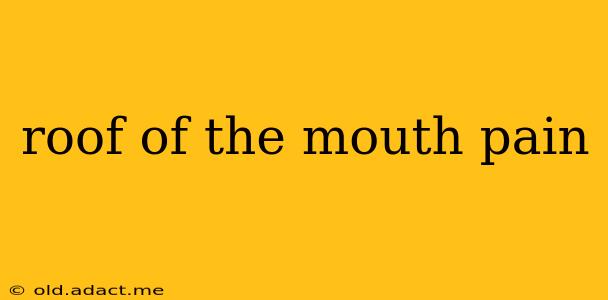Experiencing pain on the roof of your mouth can be incredibly uncomfortable and disruptive. This area, medically known as the palate, is sensitive and prone to various issues. Understanding the potential causes, associated symptoms, and available treatments is crucial for effective management. This comprehensive guide will explore the common reasons behind roof-of-the-mouth pain and offer insights to help you navigate this discomfort.
What Causes Pain on the Roof of My Mouth?
The causes of roof-of-the-mouth pain are diverse, ranging from minor irritations to more serious underlying conditions. Let's explore some of the most frequent culprits:
1. Minor Irritation and Injuries:
- Burns: Hot food or drinks are a common cause of palate burns, resulting in immediate and sharp pain. The severity depends on the temperature and duration of exposure.
- Cuts or Abrasions: Accidental cuts from sharp food or objects can lead to pain, bleeding, and discomfort.
- Dry Mouth (Xerostomia): A lack of saliva can leave the palate feeling dry, irritated, and sore. This is often associated with medication side effects or underlying medical conditions.
- Ill-fitting Dentures: Poorly fitting dentures can rub against the palate, causing irritation, sores, and pain.
2. Infections:
- Oral Thrush (Candidiasis): A fungal infection caused by an overgrowth of Candida albicans, often manifesting as white patches on the palate and causing burning or soreness.
- Viral Infections: Conditions like the common cold or herpes simplex virus can sometimes cause palate pain.
3. Medical Conditions:
- Apthous Ulcers (Canker Sores): While typically found on the inside of the cheeks or lips, canker sores can sometimes develop on the palate, causing painful, shallow ulcers.
- Lupus: This autoimmune disease can affect various parts of the body, including the mouth, causing pain and inflammation.
- Pemphigus Vulgaris: A rare autoimmune blistering disease that can affect the mouth and skin. It manifests as painful blisters and ulcers.
4. Other Potential Causes:
- Allergies: Allergic reactions to certain foods or substances can cause inflammation and pain in the palate.
- Smoking: Chronic smoking can irritate the mouth tissues, contributing to pain and discomfort.
- Certain Medications: Some medications have side effects that can lead to mouth dryness or irritation.
- Radiation Therapy: Radiation therapy to the head and neck area for cancer treatment can damage the mouth tissues, resulting in pain and dryness.
What Are the Symptoms of Roof of the Mouth Pain?
The symptoms of roof-of-the-mouth pain vary depending on the underlying cause. However, common symptoms include:
- Sharp, burning pain: Often associated with burns or minor injuries.
- Throbbing or aching pain: Can indicate inflammation or infection.
- Soreness: A general feeling of tenderness on the palate.
- White or red patches: Could indicate oral thrush or other infections.
- Blisters or ulcers: May be associated with canker sores or other conditions.
- Difficulty swallowing or chewing: Severe pain can make eating difficult.
How Long Does Roof of the Mouth Pain Last?
The duration of roof-of-the-mouth pain depends entirely on the cause. Minor irritations may heal within a few days, while infections or more serious conditions may require weeks or even months of treatment.
When Should I See a Doctor for Roof of the Mouth Pain?
You should consult a doctor or dentist if:
- The pain is severe or persistent.
- You notice any unusual lesions, blisters, or sores.
- You have difficulty swallowing or eating.
- The pain is accompanied by fever or other systemic symptoms.
- Home remedies fail to provide relief.
How is Roof of the Mouth Pain Treated?
Treatment for roof-of-the-mouth pain depends on the underlying cause. Options may include:
- Over-the-counter pain relievers: Ibuprofen or acetaminophen can help manage pain and inflammation.
- Topical anesthetics: These can numb the affected area and provide temporary relief.
- Anti-fungal medications: Used to treat oral thrush.
- Antiviral medications: Used to treat viral infections.
- Corticosteroids: Can reduce inflammation in certain conditions.
- Prescription mouthwashes: Can help soothe and heal irritated tissues.
- Adjusting dentures: A dentist can adjust ill-fitting dentures to prevent further irritation.
This information is for general knowledge and does not constitute medical advice. Always consult a healthcare professional for diagnosis and treatment of any medical condition. They can properly assess your symptoms and recommend the most appropriate course of action.
